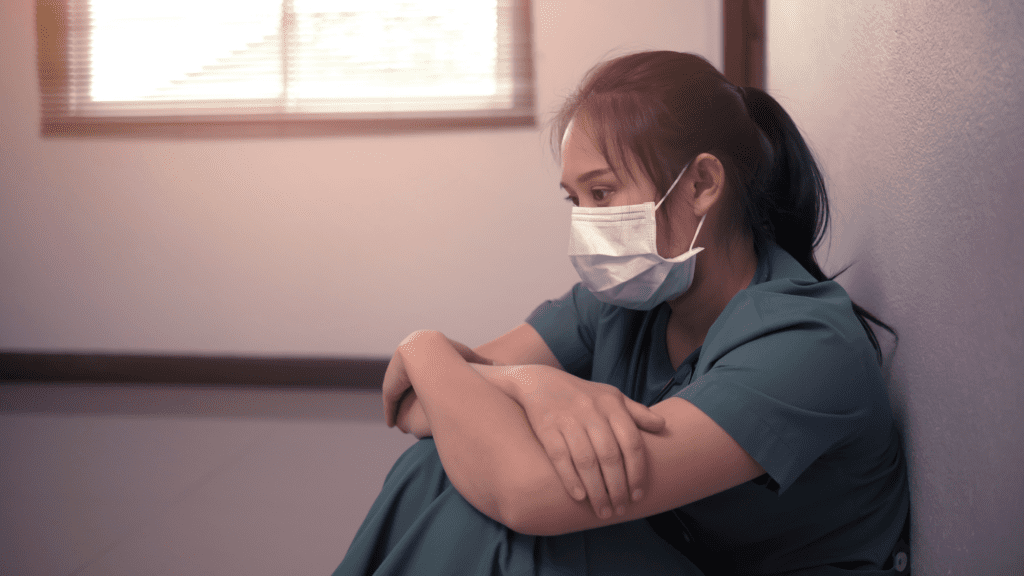COVID-19 has left its mark on all of us. Hard stories abound coming out of the pandemic, and healthcare workers have borne more than their fair share — stories of stress, overwork, grief, burnout, an overburdened hospital system, and a lingering pandemic.
Some of them are stories of moral distress, even moral injury. They had to navigate complex and unfamiliar moral landscapes at the height of the pandemic. They had to do things they normally would not, or could not do things they normally would in caring for their patients.
Stories like these. (Please note: I’ve changed names and other minor details, but the events described are real, and have been related to me first- or second-hand.)
“Erica”, a social worker in palliative care, had to tell a dying patient’s family that they couldn’t come to say goodbye. “Don”, a registered nurse in aged care, had to try to care for a confused patient with dementia while wearing full personal protective equipment (PPE). “Sylvia”, the manager of an ICU, wondered whether she would have enough beds to care for an influx of patients — and had to turn some away.

These are things they would never normally have to do. The exigencies of the pandemic got in the way of them caring for their patients the way they normally would. And those failures prompt distress — sometimes deep distress, even wounds. In addition to all the problems healthcare workers have experienced with overwork and burnout, some are now dealing with what’s called moral injury.
Moral injury in healthcare
The term “moral injury” was developed in military contexts to help clinicians understand the experience of veterans of recent conflicts. Post-traumatic stress disorder (PTSD), while important, didn’t account for all their symptoms, nor did it provide an adequate framework for their treatment: the wounds left by war were not just physical and psychological, they were moral and spiritual. The category “moral injury” was developed by those caring for troubled veterans in an attempt to address these invisible wounds — wounds that arise from witnessing or perpetrating acts that conflict with deeply held internalised moral beliefs and values.
Those caring for troubled healthcare workers are coming to see that what they’re dealing with goes beyond stress and burnout. Healthcare workers may be struggling to come to terms with moral injury.
Now, it’s important to recognise that the experiences of healthcare workers are both like and unlike those of veterans. The violence of war is integral to the experience of military personnel in a way that is not the case for (most) healthcare workers. This means that, while healthcare workers may experience trauma — and so are at risk of PTSD — the trauma they experience is generally different to what veterans endure, and is unlikely to come with the physical wounds that veterans bear.
Nonetheless, I believe the category still applies. Both veterans and healthcare workers have strong moral codes that motivate them and guide their actions. They face difficult decisions in high-stakes environments, often with significant constraints on their actions. They can also feel — and be — betrayed by their superiors or the institutional contexts in which they work, and be forced to witness the resulting harms to others.
The stories I have heard — and that so many caring people have had to live through — are stories of moral injury, as defined by psychotherapist David William Alexander: “the lasting psychological, biological, spiritual, behavioral, and social impact of perpetrating, failing to prevent, or bearing witness to acts that transgress deeply held moral beliefs and expectations.” Some are stories of what could be called “moral injury – other”, where their wounds are inflicted by the actions of a superior, or result from systemic or institutional failure. Others are stories of “moral injury – self”, where the healthcare worker’s own actions — or inactions — are what have wounded them.
Wronged or harmed?
Getting ideas and terms right helps us here, including (ultimately) at a therapeutic level. In particular, it is important to distinguish between wrongs and harms, and then think about how we respond to them. This important distinction seems largely to have been lost in our results-oriented society, but it’s important in helping people understand and respond to potentially morally injurious experiences. It is also familiar to most healthcare workers in relation to medical risk and informed consent.
Healthcare workers desperately wanted to care for their patients the way they normally would, to honour their inherent dignity, but were unable to do so.
Someone is harmed by another person if that person’s actions result in injury or significant disadvantage. Someone is wronged by them if they are not treated with the respect or dignity that is due to them as a person. That distinction is fundamental to risk assessment and informed consent in clinical situations.
All medical and surgical interventions carry the risk of side-effects or complications. They are not intended, but they are the result of a practitioner’s actions. For instance, if a surgeon treats her patient with respect and (so) competently performs a procedure which nonetheless goes wrong, she is responsible for the harms so caused, but not guilty of wronging her patient.
With this distinction in mind, let me return to those earlier stories of medical moral injury in the pandemic.
The social worker was prohibited under law from allowing her client’s relatives in to say goodbye. The aged care nurse was required by law to wear full PPE, and so was not able to give his patient a face to see or a warm hand to hold. The ICU manager did not have a bed to give the patient in respiratory distress. They didn’t withhold that care because they couldn’t be bothered, or because they didn’t think the person deserved it — that would be a wrong for which they should rightly feel guilty. Quite the contrary.
In all these instances healthcare workers desperately wanted to care for their patients the way they normally would, to honour their inherent dignity, but were unable to do so. And people suffered — were harmed — as a result of their actions. This is what triggers their distress, and potential moral injury. They did no wrong, but someone was harmed.
I think that getting this distinction right has a couple of important benefits. To begin with, it allows for appropriate appraisal of their actions; it also enables a more appropriate response to their experience. True, what they did, and what followed from it, is fundamentally inconsistent with their deeply held moral commitments. As such, it prompts moral distress and has the potential to cause moral injury. But recognising the kind of responsibility they have — and the clear limitations on it — changes how they see those events, and themselves in light of them.
It also allows them to respond more appropriately to their experiences. For we rightly express regret for the harms that follow from our actions, whereas we rightly express remorse for the wrongs we have done. In both instances it is appropriate to apologise, to say sorry for what we’ve done. But in each case “sorry” is doing different work.
In the first case, it recognises that someone has been harmed, and that it’s because of something I did; but it also expresses regret — a set of attitudes and feelings showing that I deeply wish it had turned out otherwise. And sometimes it’s an acknowledgement that the system that constrained them is broken — something that takes us beyond regret to lament (more on this in a moment).
In the second case, my apology recognises that someone has been wronged, and that it’s because of something I did; but it also expresses remorse — a set of attitudes and feelings showing that I recognise I am responsible for the wrong I have done, or am complicit in the system’s failure (and the harms that probably followed). It also acknowledges that I cannot undo the wrong for which I am responsible and so, if there is any path forward for this relationship, it depends on the wronged person’s gracious forgiveness.

We can do very different things in saying sorry, and having someone else accept it, but both kinds of apology can help healthcare workers deal with the distress of potentially morally injurious experiences. But apology takes us only so far.
For sometimes there’s no possibility to say sorry. The person has now died. The family has moved on. The person with dementia has little, if any, memory of the events and may not understand any explanation you might give. The nursing home or hospital or government body doesn’t allow you to say sorry — either because they fail to acknowledge their contribution to the problem, or fear litigation if they were to admit it.
Confession and lament
Christian communities can play an important role here with our rich traditions of confession and lament. (Other traditions will have their own, sometimes comparable, ways of processing guilt and harm.) For if we are unable to apologise to our patient (or their surviving relatives), we can confess our failings to God — and our sins, the ways we have offended against others and so also against God — and know God’s forgiveness. Indeed, those who profess faith in Jesus can be confident that God forgives those who truly express remorse and trust in God’s grace.
Confession is not a therapeutic strategy, but a spiritual discipline. Even so, it can free us from the burden of our wrongs, and so help us deal with (potential) moral injury.
As can lament — and this plays an important role in responding to both harms and wrongs. For harms and wrongs both leave a residue in the world. There are things we cannot fix. Moreover, both reflect a fundamental brokenness in the world, in the systems we inhabit, in ourselves. A brokenness we are unable to mend; a darkness that moral injury may bring to light.
That is what lament acknowledges. This deep, rich, complex practice that — so beautifully expressed in the Psalms and so well-established in Jewish and Christian practice — rails against the darkness we endure, cries out against the forces that crush and constrain us, weeps with those whose lives are broken, and calls the God we believe loves the world and governs it in love to act.
So many hard stories have come out of the pandemic. For healthcare workers, many of them come with the risk of moral injury. We need to recognise that, and help them deal with it. Distinguishing between harms and wrongs, and engaging in the moral and spiritual practices that follow, may go a long way towards helping wounded workers navigate their morally injurious landscape.
Andrew Sloane is a former medical practitioner, a Lecturer in Old Testament and Christian Thought at Morling College, and an Associate of the Centre for Public Christianity.
This article first appeared at ABC Religion & Ethics.